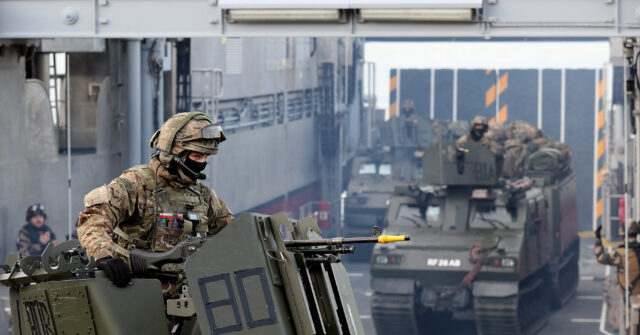British government minister speaking ahead of Friday’s Trump-Putin summit says the UK is ready to deploy troops “from day one” of a ceasefire should one be agreed in the coming days.
British soldiers will be deployed to Ukraine as part of the Coalition of the Willing group led by the UK and France, defence minister John Healey said on Friday morning hours ahead of the planned Alaska Ukraine peace summit between U.S. President Donald Trump and Russian Federation President Vladimir Putin which is slated to take place overnight UK time.
Healey told UK state broadcaster the BBC that: “In the circumstances of a ceasefire we’re ready to put UK boots on the ground in Ukraine… They are ready to go, they’re ready to act from day one”.
He dismissed questions of British soldiers being fired upon by Russian forces should the ceasefire later falter as hypothetical, but nevertheless noted: “any British forces have the right to defend themselves if attacked”.
Justifying the plan to send British troops to Ukraine, Healey said supporting Ukrainian troops, helping them to regroup and rearm, would be “strongest deterrence against Russia reinvading”.
On how he expected things to progress, Healey said on Friday that he hoped the Trump-Putin summit today would be a “first step towards serious negotiations” and “the end to war must come through talking, must come from diplomacy.”
President Trump himself has made clear he thinks a second meeting in a trilateral format, involving Ukraine’s President Volodymyr Zelensky as well, is where the real work will be done. But Russia has not agreed to attend such a meeting and persuading Vladimir Putin to sit around a table with his Ukrainian opposite number will be much of the struggle for the talks today.
The United Kingdom and France established a joint military headquarters in France for the Coalition of the Willing last month. The British government said of the arrangement at the time that it “will include a 3-star multi-national operational headquarters… to oversee all tactical and operational arrangements”. The headquarters would rotate to London after 12 months, they said.
Should a time come when Coalition forces deploy to Ukraine, “a co-ordination cell, headed up by a UK 2-star military officer will also be set up in Kyiv”.
Downing Street said the main ambitions of the force are to help regenerate Ukraine’s land forces, secure Ukraine’s skies “using Coalition aircraft to deliver Air Policing”, and to patrol the Black Sea.
While the Coalition theoretically has dozens of contributing partners worldwide, many of which come from across Europe, it has struggled to get any definite promises of actual military support for the planned peacekeeping force from any nations beyond the core UK-France group. Germany and Poland have been the closest of all, but Germany in particular has proven reluctant and has questioned boots on the ground.
Wary of setting up a nuclear tripwire in eastern Europe, the United States has made clear that if it offers security guarantees to the European force — which are not yet certain — it would be a non-NATO deal. Flying to the Alaska summit on Friday, President Trump said to attendant reporters that he would “maybe” provide guarantees, The Financial Times reported, but “not in the form of NATO”.
President Trump was tough on Russia in his remarks mid-flight, warning that if he had gone all that way to find President Putin has only meant to string him along and wasn’t dedicated to peace, he would retaliate. He said: “Economically severe. Yes, it will be very severe. I’m not doing this for my health, okay… I don’t need it. I’d like to focus on our country, but I’m doing this to save a lot of lives. Yeah, very severe.”
Read the full article here


